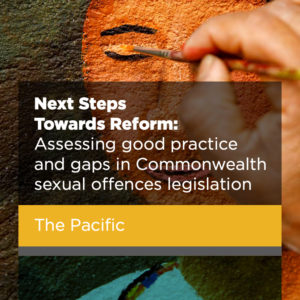The Solomon Islands sexual offences laws are found in the Penal Code as amended by the Penal Code (Amendment) (Sexual Offences) Act 2016 (PCASO). The Evidence Act 2009 (EA) contains the rules of evidence which apply to sexual assault offences.
The provisions of the Penal Code (Amendment) (Sexual Offences) Act 2016 in some respects meet good practice standards, including gender-neutral offences for adults and children, the use of terminology that is legal and not moralistic and a comprehensive definition of sexual assault covering penetration of all orifices by any body part or object. Marital rape is expressly a crime under the PC and extends to those persons in ‘a marriage-like relationship’. Consensual sexual activity with a person who has a disability is not an offence and the Act does not use discriminatory, derogatory or stigmatising language to describe a person with a disability.
Other areas of the law only partly meet the good practice criteria. For example, the legislation criminalising non-penetrative sexual assault is limited and does not define ‘indecent act’ or specify that it includes all acts of sexual touching (e.g. groping) of any part of the body. Evidence of a complainant’s prior sexual history with the accused or other persons is admissible with permission of the court without adequate safeguards for their privacy and other rights. The legislation does not specify that consent cannot be inferred from a complainant’s silence or submission during the assault. There are no close-in-age defences for child sexual assaults to prevent criminalising consensual sexual activity between young people when one or both is under the age of consent.
The Solomon Islands continues to criminalise consensual same-sex sexual activity and the legislation uses derogatory and stigmatising language for these offences, such as ‘buggery’, ‘gross indecency’, ‘unnatural offences’ and ‘indecent practices’. Laws that criminalise consensual same-sex sexual activity, such as ‘buggery’ and ‘sodomy’, should be repealed and all non-consensual sexual acts, including anal ‘rape’, should be included in the standard sexual assault provisions, such as ‘rape’ and ‘sexual assault’, as well as in child sexual offences. All of these crimes should be gender-neutral.
The Solomon Islands is a state party to only two relevant international human rights treaties, the Convention on the Elimination of All Forms of Discrimination against Women and Convention on the Rights of the Child. It has signed but not ratified the Convention on the Rights of Persons with Disabilities. The Solomon Islands has not joined the Convention against Torture and Other Cruel, Inhuman or Degrading Treatment or Punishment or the International Covenant on Civil and Political Rights.
Read more about the criminalisation of LGBT people in the Solomon Islands.
The full assessment of the Solomon Islands is available here.



